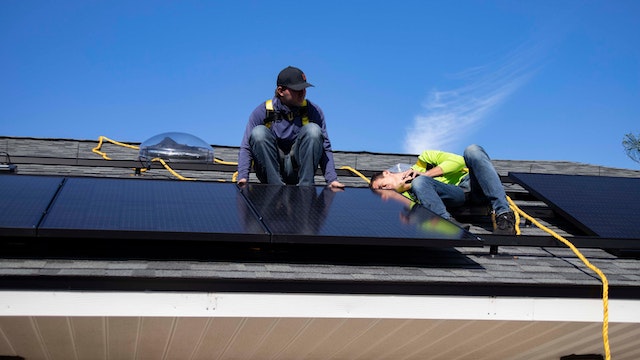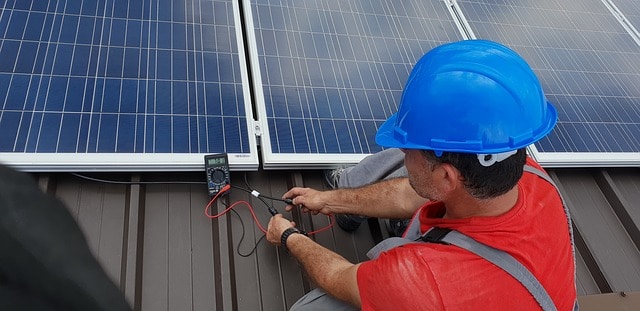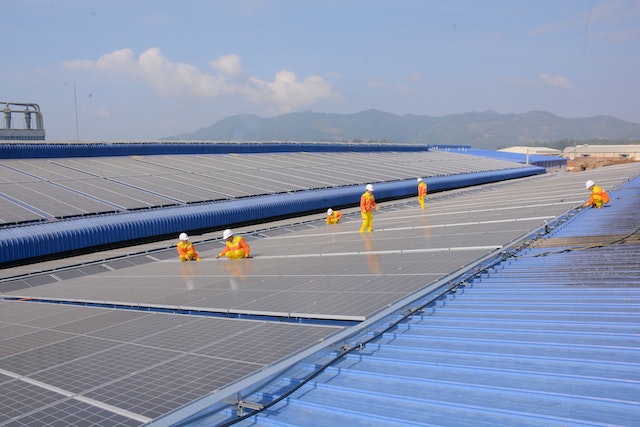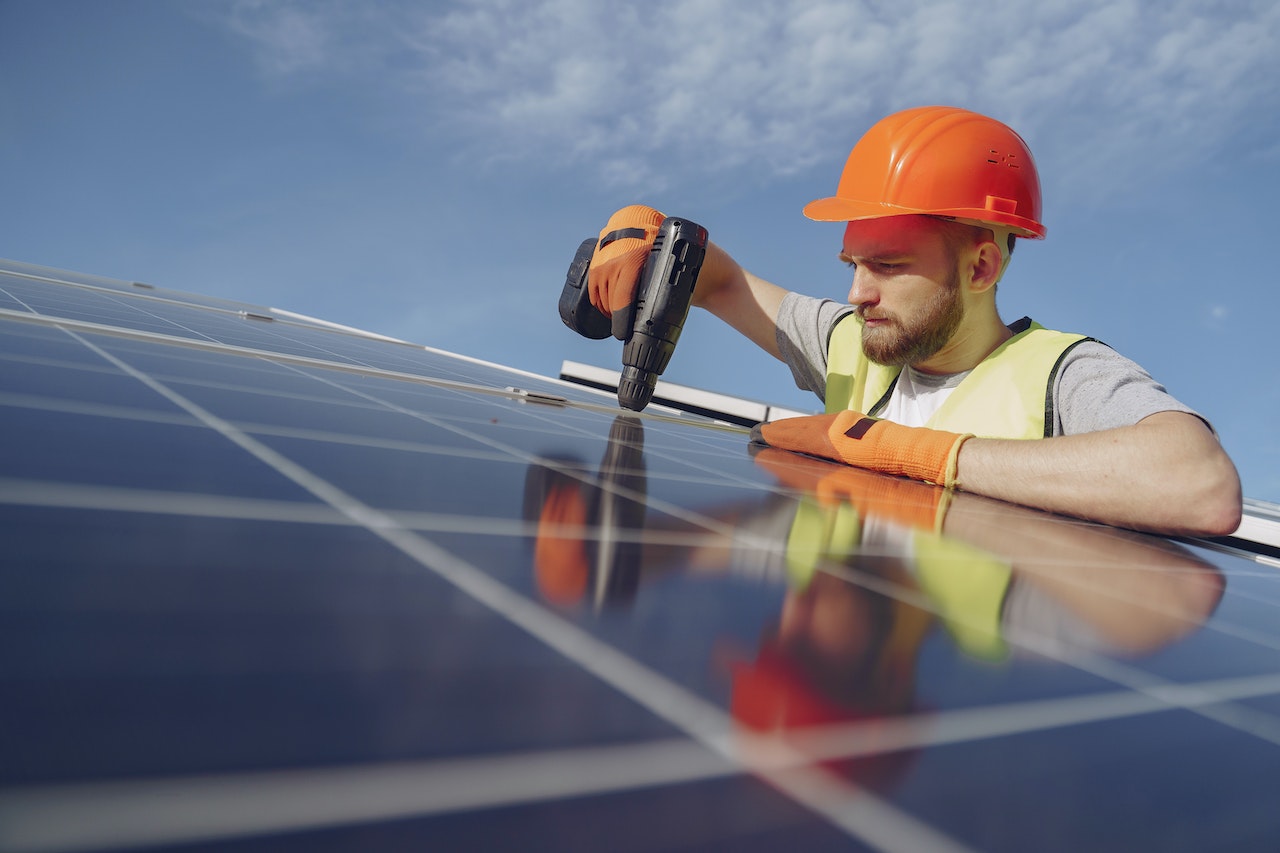How to Become a Solar Panel Installer
In an era where renewable energy is taking center stage, understanding how to become a solar panel installer can be the start of a promising career path. Also, Solar power, a cornerstone of the renewable energy sector, is increasingly being adopted across the United States, and solar panel installers are in high demand. This guide provides insights into the necessary skills, training, and qualifications needed to succeed in this dynamic profession.
Getting Started: Education and Training
High School Diploma and Vocational Training
In fact embarking on a career as a solar panel installer often begins with a high school diploma or its equivalent. Firstly, this foundational education is vital for understanding the basics of electrical work and safety procedures, which form the crux of a solar installer’s role.
What’s more, Post-secondary education, while not always required, can significantly enhance job prospects. Did you know Vocational schools and community colleges often offer specific training programs for solar technicians. For instance, a trade school degree in electrical technology provides a strong foundation in electrical systems and power tools, giving an advantage in the solar industry.
Solar Training Programs
Solar training programs are also a great idea for getting hands-on experience with solar panel installation. In fact, these programs typically cover solar power fundamentals, solar system components, installation practices, and safety measures. In addition training centers across the United States offer both online courses and hands-on training.
Notably, the North American Board of Certified Energy Practitioners (NABCEP) provides a solar PV installation course for individuals seeking to become professional solar installers. According to the Bureau of Labor Statistics, a formal qualification like the NABCEP certification significantly improves job opportunities in this field.
Getting Your Feet Wet: Experience and Apprenticeships

Entry-Level Positions and Internships
After the completion of a training program, it’s usually a good idea to seek an entry-level position or internship in the solar industry. Since these opportunities offer valuable on-the-job training and provide a practical understanding of the installation of solar energy systems.
Apprenticeship Programs
Obviously, Apprenticeship programs are also an ideal route to gain practical experience and become adept in the field. Further, these programs often involve working under the guidance of a licensed solar installer or a certified solar installer, providing hands-on experience with solar modules, support structure setup, and electrical grid connection.
Yet the job experience gained from these programs, combined with formal education and training, makes you an ideal candidate for solar panel installer positions across the United States. Evidently, as the solar industry continues to expand, local governments and state governments increasingly offer apprenticeship programs to meet the high demand for solar photovoltaic installers.
However, remember that your journey into becoming a solar panel installer may vary, depending on local jurisdiction, job outlook, and personal aspirations. Importantly keep an open mind, remain persistent, and continually seek opportunities to grow and refine your skills in the dynamic solar power sector.
In the next segment of the article, we will delve into the certification process, necessary skills, and potential career paths for solar panel installers. Keep reading!
Earning Your Stripes: Certifications and Licenses
Solar Certifications
Firstly, obtaining a solar certification can be a game-changer in boosting your career prospects. For instance, the North American Board of Certified Energy Practitioners (NABCEP) is a global certification leader that offers multiple credentials in the solar power field. Obviously, these range from entry-level knowledge certificates to professional certification programs for solar panel installers.
Besides, pursuing certification like the NABCEP PV Installation Professional Certification not only validates your competency and adherence to best practices but also enhances trust with clients. Certified solar installers have proven their knowledge and experience, assuring clients of their capability to meet their solar power needs.
Licenses
Interestingly, licensing requirements for solar panel installers can vary by state and local laws. In fact, some states, like New Jersey, require solar contractors to have a home improvement contractor license. Always make sure to check with your local jurisdiction to understand the specific requirements in your area.
Diving Deeper: Understanding Licensing Requirements

As previously mentioned, licensing requirements for solar panel installers can vary widely depending on local laws and regulations. It is crucial to comprehend these differences because working without the necessary licenses can lead to fines, penalties, or being barred from practicing in certain areas.
For example, in states like New Jersey, solar panel installers are required to possess a Home Improvement Contractor (HIC) license. This specific license helps guarantee the quality of workmanship and protects the consumers against potential scams or shoddy work.
Importance of Adhering to Local Laws
Local laws and regulations aren’t just legal hoops to jump through; they often exist to protect both the solar contractors and the clients they serve. Adhering to these rules helps maintain a high standard of work within the solar industry, fostering trust between installers and their clients.
In addition to this, following local laws ensures that solar installations comply with safety standards and building codes, which is vital for the safety of residents and the long-term operation of the solar systems.
Interestingly, a report from the Solar Energy Industries Association (SEIA) highlighted that U.S states with established licensing and certification standards showed a higher rate of solar panel adoption. This is an indication that the legitimacy and credibility associated with licensing help in boosting consumer confidence and the growth of the solar industry (source: “U.S. Solar Market Insight Report 2023”, Solar Energy Industries Association).
It’s clear that understanding and adhering to licensing requirements isn’t just a matter of legality; it’s also a pathway to success in the solar industry.
Essential Skills and Qualities for Success

Technical Skills
Mastering the necessary technical skills is paramount for successful solar panel installation. These skills include understanding solar panel systems, PV cells, electrical work, and safety procedures. Additionally, knowledge of heavy equipment operation and electrical grid connection is vital.
Physical Strength and Stamina
The job of a solar installation technician often involves manual labor, such as lifting heavy solar modules and climbing ladders. Therefore, physical strength and stamina are important. Working safely on rooftops, construction sites, or commercial properties is a significant part of the job.
Attention to Detail
Precision is critical in solar panel installation. Whether it’s aligning solar modules, connecting electrical systems, or following safety procedures, attention to detail ensures efficiency and minimizes potential mistakes or accidents.
Teamwork
Solar panel installers often work as part of a team. Being able to collaborate effectively with others and contribute to a positive work environment is crucial for success.
In the next part of the article, we will discuss the career outlook for solar panel installers and provide answers to frequently asked questions about the profession. Stay with us as we continue to illuminate the path to a promising career in the solar industry.
The Bright Future: Career Outlook and Opportunities

According to the Bureau of Labor Statistics, the job outlook for solar photovoltaic installers is incredibly promising. This profession is expected to grow significantly faster than the average for all occupations, with a high demand for these skilled workers in various states of the United States.
One key driver of this growth is the ongoing shift towards renewable energy. As residential and commercial customers increasingly opt for solar power, the need for skilled professionals to install and maintain these solar panel systems is on the rise.
A career as a solar panel installer also offers potential for advancement. With years of experience, a solar technician can progress to supervisory roles or start their own solar contractor business. The journey from an entry-level position to a successful solar panel installer can be rewarding, both personally and professionally.
4 Frequently Asked Questions About How to Become a Solar Panel Installer
Do I need formal education to become a solar panel installer?
While a high school diploma is often a minimum requirement, specific training in solar power systems or electrical work can be beneficial. Vocational schools, community colleges, and trade schools offer relevant degree programs.
How can I gain practical experience in solar panel installation?
Hands-on experience is crucial in this profession. This can be obtained through entry-level positions, internships, or apprenticeship programs offered by various organizations and local governments.
What’s the significance of certifications in this profession?
Certifications, such as those offered by the NABCEP, validate your knowledge and skills in solar panel installation. They enhance credibility among clients and employers, often leading to better job opportunities.
Are there specific physical requirements for this job?
Yes, physical strength and stamina are essential due to the manual labor involved. Installers often need to lift heavy equipment, climb ladders, and work on rooftops.
In the final segment of the article, we will provide a step-by-step guide on how to become a solar panel installer and offer some concluding thoughts on this rewarding career path. Stay tuned!
Step-by-Step Guide to Becoming a Solar Panel Installer

Becoming a professional solar installer involves a series of steps that require education, experience, and often, certification. Here’s a step-by-step guide to help you navigate this process:
Step 1: Firstly, Obtain a High School Diploma or its Equivalent
This is the basic educational requirement. Subjects like math, physics, and vocational training can provide a strong foundation for understanding electrical systems.
Step 2: Pursue Further Education or Training
Enroll in a trade school, community college, or vocational school to learn more about electrical systems, solar power, and safety procedures.
Step 3: Gain Practical Experience
Get an entry-level job or an internship in the solar industry to get hands-on experience. Participating in an apprenticeship program is another excellent way to gain real-world experience.
Step 4: Seek Certification
While not always mandatory, certifications such as the NABCEP PV Installation Professional Certification can enhance job prospects and credibility with clients.
Step 5: Obtain a License if Required
Check the local laws and regulations in your area. Some states require solar panel installers to be licensed.
Step 6: Continue Learning and Stay Updated
The solar industry is dynamic. Keep up with the latest technologies, installation methods, and best practices by participating in continuing education programs and courses.
Conclusion: Illuminating the Path
Solar energy, a fast-growing sector within the realm of renewable energy, is creating an abundance of job opportunities for solar panel installers. As solar panels continue to become a more common sight on residential installations and commercial properties, the demand for skilled installers will likely continue to soar.
Importantly, embarking on the journey to becoming a solar panel installer requires a mix of formal education, hands-on training, and a dedication to continuous learning. Armed with these, you’ll be well on your way to making a significant impact on our planet’s sustainable future.
So, are you ready to harness the power of the sun and light up your career? The solar industry is the right place, and now is the right time!
In this ever-evolving industry, remember that hard work, the right skill set, and the willingness to keep learning are the fuel for your successful career as a solar panel installer. It’s not just a job; it’s a career path illuminated by the sun!
Recent Posts
Understanding Energy and Electricity: The Power For Progress
Energy and Electricity Energy and electricity are integral components of modern life, powering everything from homes and businesses to transportation and communication. Without them, the...
The Future of Wind Energy The future of wind energy is set to play a critical role in addressing global energy needs while combating climate change. As renewable energy sources like wind and...


